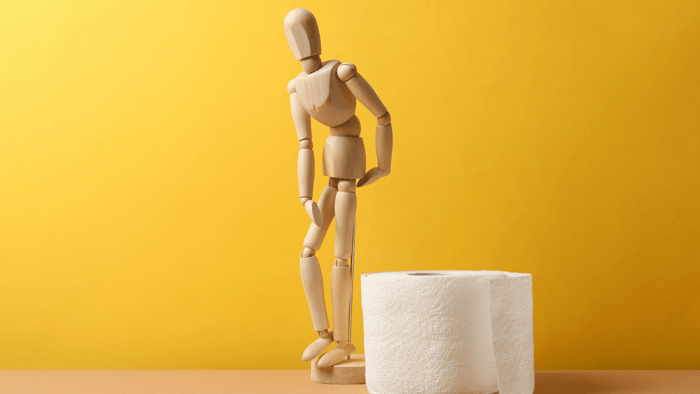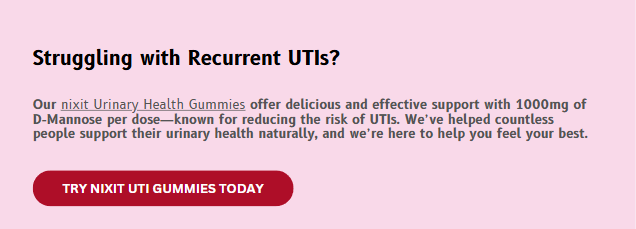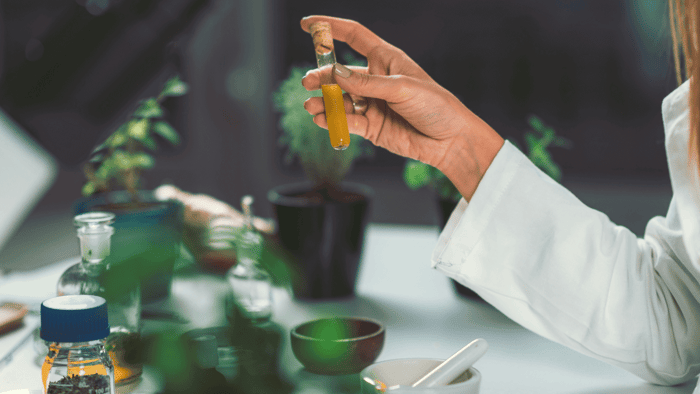Urinary Tract Infections (UTIs) occur when bacteria enter the urinary system, leading to uncomfortable symptoms such as burning urination and frequent trips to the bathroom. This article explores what causes a UTI, their symptoms, how they feel, how to identify them and how to prevent them.
Table of Contents
- What is a UTI?
- Recognizing the Signs of a UTI
- What Does a UTI Feel Like?
- How to Determine If You Have a UTI
- Common Triggers of UTIs
- The Link Between UTIs and Sexual Activity
- Can Poor Hand Hygiene Lead to a UTI?
- Can a UTI Be Transmitted?
- The Role of Hydration in UTI Prevention
- Practical Methods to Prevent UTIs
- Other Frequently Asked Questions
What is a UTI?
A urinary tract infection (UTI) is an infection that occurs in any part of the urinary system, including the bladder, urethra, ureters, and kidneys. Most UTIs affect the lower urinary tract (bladder and urethra), but severe cases can spread to the kidneys, leading to more serious complications.
Recognizing the Signs of a UTI
Early detection of UTI symptoms can help prevent complications. Common indicators include:
Common UTI Symptoms:
A strong, persistent urge to urinate
Burning sensation while urinating
Passing frequent, small amounts of urine
Cloudy or strong-smelling urine
Pelvic pain (in women)
Feeling tired or shaky
Fever or chills (a sign of a kidney infection)
What Does a UTI Feel Like?
A UTI can feel different depending on its severity. Most people describe it as a burning or stinging sensation during urination, along with bladder discomfort and pressure. If the infection spreads to the kidneys, back pain, nausea, and fever can occur.
How to Determine If You Have a UTI
If you experience any of the symptoms mentioned above, you may have a UTI. A doctor can confirm a UTI through a urine test, which detects bacteria and white blood cells. If left untreated, the infection can spread to the kidneys, leading to serious complications.
Common Triggers of UTIs
A UTI typically develops when bacteria enter the urethra and multiply in the urinary tract. The most common bacteria responsible for UTIs is Escherichia coli (E. coli), which naturally resides in the intestines but can enter the urinary tract.
Factors That Increase UTI Risk:
- Poor Hygiene – Wiping from back to front after using the toilet can introduce bacteria into the urethra.
- Holding in Urine – Delaying urination allows bacteria to multiply in the bladder.
- Sexual Activity – Intercourse can push bacteria into the urethra.
- Using Irritating Products – Scented soaps, douches, and certain spermicides can disrupt the natural balance of bacteria.
- Dehydration – Low water intake reduces urination frequency, making it easier for bacteria to thrive.
- Weakened Immune System – Conditions like diabetes can increase susceptibility to infections.
- Menopause and Hormonal Changes – Lower estrogen levels can lead to changes in the urinary tract that make infections more likely.
The Link Between UTIs and Sexual Activity
Sexual activity increases the risk of UTIs, especially in women, due to the shorter length of the urethra. During sex, bacteria from the genital area can enter the urethra and travel to the bladder, leading to an infection.
Ways to Minimize UTI Risk After Sex:
Urinate before and after intercourse to flush out bacteria.
Stay hydrated to keep the urinary tract clear.
Use water-based lubricants to reduce friction and irritation, which can help prevent bacteria from entering the urethra.
Use chemical-free latex condoms, as they provide a protective barrier while preventing harmful bacteria from being introduced.
Can Poor Hand Hygiene Lead to a UTI?
Yes. If bacteria from the hands or genitals come into contact with the urethra during manual stimulation, it can lead to a UTI. Proper hygiene, such as washing hands before intimate activity, can help reduce this risk.
Can a UTI Be Transmitted?
UTIs are not classified as sexually transmitted infections (STIs), but sexual activity can contribute to bacterial transfer. A person cannot pass a UTI to a partner, but bacteria from one partner may contribute to recurring infections in another.
The Role of Hydration in UTI Prevention
Inadequate hydration reduces urine production, allowing bacteria to grow unchecked in the urinary tract. Drinking plenty of water helps flush out bacteria and reduce the risk of infection.
Practical Methods to Prevent UTIs
Simple Ways to Lower Your Risk:
Drink plenty of water to flush out bacteria.
Wipe front to back after using the bathroom.
Urinate after sex to clear bacteria from the urethra.
Avoid using harsh soaps and douches.
Wear cotton underwear and loose-fitting clothes.
Take UTI prevention supplements, such as UTI gummies, to help support urinary health and flush the urinary tract effectively.
By understanding what causes a UTI and recognizing symptoms early, you can take steps to prevent infections and protect your urinary health. If you suspect a UTI, seek medical attention to prevent further complications.
Other Frequently Asked Questions
How Long Does a UTI Last?
With antibiotics, a mild UTI can clear up in 3-5 days. Without treatment, symptoms may persist or worsen.
Can Men Get UTIs?
Yes, but UTIs are less common in men due to the longer length of the male urethra.
Can a UTI Go Away on Its Own?
Some mild UTIs may resolve without antibiotics, but medical treatment is recommended to prevent complications.
By understanding what causes a UTI and recognizing symptoms early, you can take steps to prevent infections and protect your urinary health. If you suspect a UTI, seek medical attention to prevent further complications.
Check out our nixit Urinary Health Gummies today!
This content is for informational purposes only and is not intended to diagnose, treat, cure, or prevent any disease. Self-treatment is not recommended for life-threatening conditions that require medical treatment under a doctor's care. For many of the conditions discussed, treatment with prescription or over the counter medication is also available. Consult your doctor, practitioner, and/or pharmacist for any health problem and before using any supplements or before making any changes in prescribed medications.





